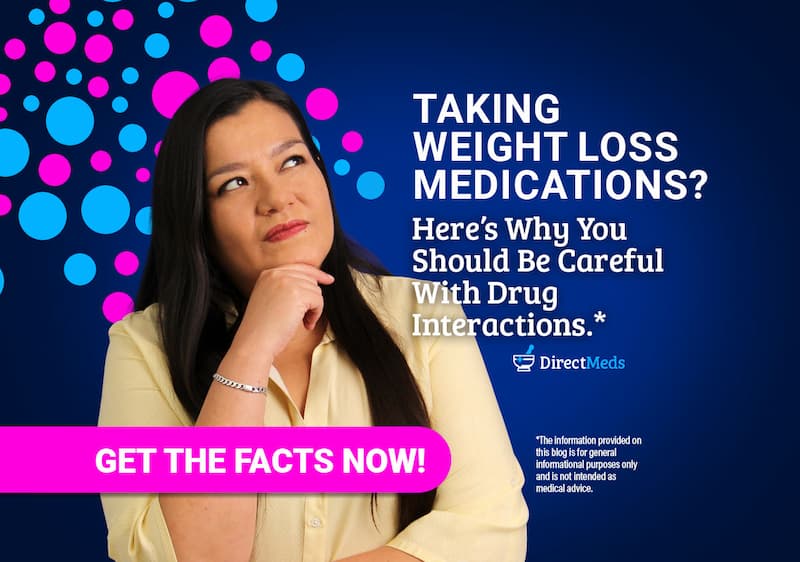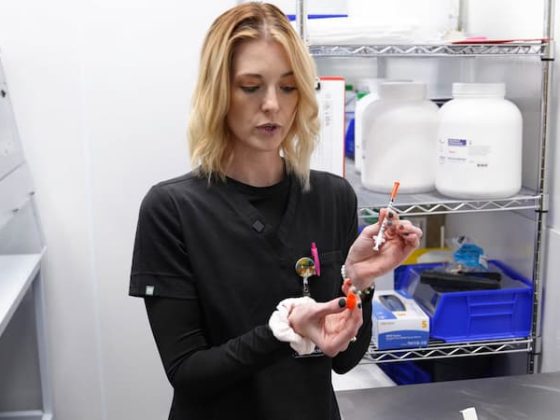Let’s talk about drug interactions- the mixed cocktail you didn’t order. I know it’s not the most exciting topic, but trust me, this is something you definitely want to know about! In my opinion, this subject is severely underdiscussed!
When I started my weight loss journey, I had no idea how complex these medications could be when mixed with other medications. Think of it like being a DJ – you can’t just mix any two songs together and expect a hit! The same goes for prescription and over the counter drugs.
The Medication Mix-Up: What You Need to Know
I learned very quickly how important it was to consider all the drugs I was taking when I started semaglutide, and thankfully, my doctor was proactive about it, but I think it’s important to be informed! So let me save you some trouble and break down the most common interactions you should know about.
Antidepressants and Anxiety Meds
These medications (especially SSRIs and SNRIs) can interact with weight loss meds because both affect your brain chemistry, particularly serotonin levels. Continuing the DJ example, it’s like having two DJs trying to remix the same song – they’re going to clash!
- What to Look Out For: Watch for changes in your mood (feeling extra anxious or irritable), confusion, rapid heartbeat, or muscle stiffness. If you start feeling “off” in any way, that’s your body telling you something needs attention.
Blood Pressure and Heart Medications
Some weight loss meds (especially stimulant types) can increase your heart rate and blood pressure, which might work against your heart meds. Imagine pressing the gas and brake pedals at the same time – not ideal!
- What to look out for: Keep an eye on changes in your blood pressure readings, unusual heart rhythms, dizziness, or feeling more tired than usual. This is why regular BP checks are super important!
Diabetes Medications
Weight loss meds can affect your blood sugar levels, and when combined with diabetes medications, it might lower your blood sugar more than expected. Think of it as a double-strength sugar reducer – not necessarily bad, but needs careful monitoring to stay safe!
- What to look out for: Signs of low blood sugar like shakiness, sweating, confusion, or feeling extra hungry. Also watch for any unusual changes in your regular blood sugar readings.
You Should Consider Your Supplements Too
Here’s a plot twist I wish someone had told me about – those “natural” supplements in your cabinet? Yeah, they count too! Be sure to consider any supplements that contain caffeine or herbal stimulants. I used to think my morning green tea extract supplement was totally harmless until my doctor explained how these supplements (including garcinia cambogia or yohimbine) may impact heart rate or decrease the effectiveness of weight loss drugs.
Tips for Managing Potential Drug Interactions
- Maintain an Updated Medication List: Always carry a list of all medications, vitamins, and supplements you’re taking. Sharing this with every healthcare provider you see ensures your team has the full picture of potential interactions.
- Stay on Schedule with Regular Check-Ups: Periodic check-ups allow your healthcare provider to monitor how your weight loss medication affects other health metrics, such as blood pressure, blood sugar, and overall well-being. Adjustments in your weight loss or maintenance plan can be made as necessary.
- Watch for Warning Signs: If you experience symptoms like dizziness, nausea, changes in mood, or heart palpitations, report them promptly. Early reporting can prevent minor issues from escalating and can help your healthcare provider make informed adjustments.
- Be Aware of Food Interactions: Some weight loss medications have specific dietary requirements or restrictions. For instance, some may require a lower fat intake, while others may recommend avoiding alcohol. Check with your doctor to understand any foods or beverages to limit or avoid altogether.
My Top Tips for Staying Safe
1. Record, Record, Record
I keep a records on my phone with ALL my medications and supplements. I highly recommend using a medication-tracking app. It’s come in handy more times than I can count, especially during unexpected doctor visits! Below are some more of the things I also try to keep a mobile record of:
- Taking photos of all your medication bottles
- Keeping digital copies of prescriptions
- Setting up medication reminders
- Keeping a note of any experienced symptoms
- Having an emergency contact who knows your medication list
2. Become a Check Up Champion
Regular check-ups aren’t just for catching up with your favorite doctor (though mine is pretty awesome!) – they’re crucial for staying safe. I recommend:
- Setting calendar reminders for appointments
- Preparing questions before each visit
- Tracking any unusual symptoms
- Doing regular blood work as recommended
- Building a relationship with your healthcare team
- Avoiding new supplements without medical approval
3. The Warning Signs Watchlist
Your body is pretty good at telling you when something’s not right. Learning how to read my body’s messages has become a crucial part of my weight loss journey. I recommend:
- Knowing your red flags (dizziness, rapid heartbeat, mood changes)
- Having an action plan for emergencies
- Keeping a symptom diary (I keep mine in my phone so I always have it!)
- Take photos of physical symptoms if you can
- Having emergency contacts readily available
- Tracking any reactions or side effects from medications or supplements
Final Thoughts
Weight loss medications can be a great support for weight management goals, but it’s important to consider all the factors and potential risks. Is managing all this a bit overwhelming sometimes? Absolutely! But is it worth it to do it safely? You bet! Remember, while I’m sharing my experience, always consult with your healthcare provider about your specific situation. We’re all different, and what works for one person might not work for another. Stay safe, stay informed, and keep crushing those goals!
I am text block. Click edit button to change this text. Lorem ipsum dolor sit amet, consectetur adipiscing elit. Ut elit tellus, luctus nec ullamcorper mattis, pulvinar dapibus leo.
The information provided on this blog is for general informational purposes only and is not intended as medical advice. Always seek the guidance of a qualified healthcare provider with any questions you may have regarding a medical condition or treatment. Never disregard professional medical advice or delay seeking it because of something you have read on this site. The content here should not be used as a substitute for professional diagnosis or treatment. Use of any information on this site is solely at your own risk.








